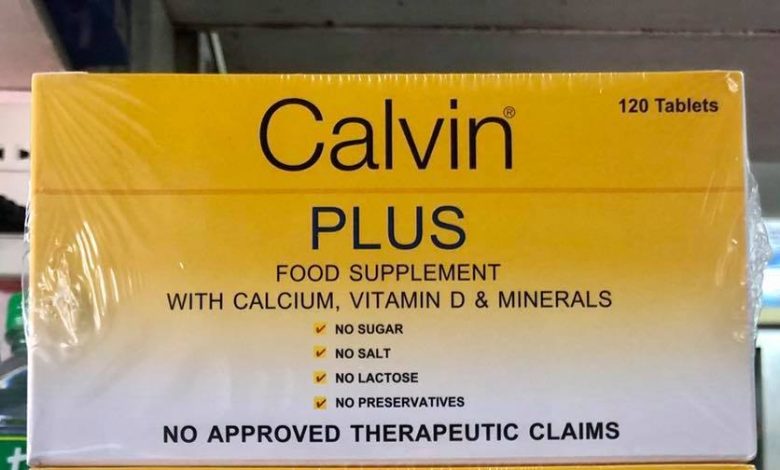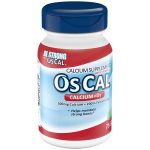Calvin Plus: Ingredients, Uses, Dosage, Benefits, Side Effects, Interactions

Calvin Plus is a dietary supplement formulated to provide additional calcium and other nutrients that support bone health. Its primary aim is to help ensure an adequate intake of calcium, which is essential for strong and healthy bones.
Each tablet of Calvin Plus contains the following ingredients:
| Ingredient | Amount per Tablet |
| Calcium carbonate | 1500 mg |
| (equivalent to Calcium) | 600.00 mg |
| Magnesium | 40.00 mg |
| Manganese | 1.80 mg |
| Zinc | 7.5 mg |
| Copper | 1.00 mg |
| Vitamin D3 (Cholecalciferol) | 200.00 IU |
| Boron | 250.00 μg |
Calvin Plus has several benefits that can include :
1. Calcium for Bone Health: Calvin Plus contains calcium carbonate, providing 600 mg of elemental calcium per serving. Calcium is a crucial mineral for the formation and maintenance of strong bones and teeth. It plays a vital role in bone development, density, and strength throughout life. Adequate calcium intake is essential to help prevent osteoporosis, a condition characterized by weakened and brittle bones.
2. Nutrients for Bone Health: In addition to calcium, Calvin Plus includes other nutrients that contribute to bone health:
• Magnesium: Magnesium is essential for bone mineralization and influences calcium metabolism. It helps regulate calcium levels in the body and plays a role in maintaining bone density.
• Manganese: Manganese is involved in the formation and maintenance of healthy bone tissue. It supports the production of collagen, a key component of bones.
• Zinc: Zinc is necessary for bone growth and development. It helps stimulate bone formation and supports the activity of cells involved in bone remodeling.
• Copper: Copper contributes to the cross-linking of collagen fibers, which gives strength and structure to bones.
• Vitamin D3: Vitamin D3 aids in the absorption and utilization of calcium. It promotes the deposition of calcium into bones, supporting bone mineralization and preventing calcium deficiency.
• Boron: Boron is a trace mineral that may enhance calcium metabolism and promote bone health.
3. Adjunct for Osteoporosis Prevention: Calvin Plus can be used as an adjunct to prevent osteoporosis, a condition characterized by decreased bone density and an increased risk of fractures. Osteoporosis prevention typically involves a combination of lifestyle measures (such as weight-bearing exercise and a balanced diet) and appropriate supplementation if necessary. Calvin Plus provides additional calcium and other nutrients that support optimal bone health, helping to strengthen bones and reduce the risk of osteoporosis.
How to take Calvin Plus
1. Dosage: The recommended dosage for Calvin Plus is 1 to 2 tablets per day. The specific number of tablets to take should be determined based on factors such as age, gender, individual nutritional needs, and the guidance of a healthcare professional.
2. Frequency: Calvin Plus is designed to be taken once a day. It is usually recommended to take the tablets with meals or as directed by a healthcare professional. Taking it with food can enhance the absorption of certain nutrients and help minimize any potential gastrointestinal discomfort.
3. Timing: The tablets can be taken at any convenient time of the day, although following a consistent daily schedule can help establish a routine and improve compliance with the recommended dosage.
4. Swallowing: The tablets should be swallowed whole with water or a suitable beverage. It is important not to crush or chew the tablets unless specifically instructed to do so by a healthcare professional or indicated in the product packaging.
5. Duration of Use: The duration of use can vary depending on individual needs, underlying health conditions, and guidance from a healthcare professional. Some individuals may require long-term use of calcium and mineral supplements for ongoing bone health support, while others may need short-term supplementation for specific nutritional needs. It is advisable to consult with a healthcare professional to determine the appropriate duration of use for your specific situation.
Contraindications
Calvin Plus is contraindicated (should not be used) in patients with the following conditions:
1. Conditions associated with hypercalcemia and hypercalciuria: Calvin Plus should not be used in individuals with conditions that are associated with high levels of calcium in the blood (hypercalcemia) or excessive calcium in the urine (hypercalciuria). Examples of such conditions include primary hyperparathyroidism, certain types of cancer, and vitamin D toxicity. The additional calcium provided by Calvin Plus could potentially exacerbate these conditions.
2. Chronic renal impairment: Calvin Plus is contraindicated in patients with chronic renal impairment, which refers to long-term kidney dysfunction. In individuals with impaired kidney function, the body may have difficulty properly processing and excreting calcium and minerals, potentially leading to imbalances. The use of Calvin Plus in these cases could further disrupt mineral metabolism and increase the risk of complications.
3. Renal stones or history of renal stones: Individuals with a history of kidney stones or those who are prone to developing kidney stones should avoid using Calvin Plus. Certain minerals present in the supplement, such as calcium, can contribute to the formation of kidney stones in susceptible individuals.
4. Renal osteodystrophy with hyperphosphatemia: Renal osteodystrophy refers to bone disorders that occur as a result of chronic kidney disease. In cases where hyperphosphatemia (elevated levels of phosphorus in the blood) is present, the use of Calvin Plus is contraindicated as it contains calcium and other minerals that could further disrupt the mineral balance in individuals with impaired kidney function.
5. Wilson’s disease, hepatic, and biliary disease (copper): Calvin Plus contains copper, which can be contraindicated in individuals with Wilson’s disease, a genetic disorder that causes excessive copper accumulation in the body. Additionally, individuals with hepatic and biliary disease may have impaired copper metabolism, and the use of Calvin Plus may not be suitable for them.
It’s important to note that contraindications may vary depending on the specific formulation and individual circumstances. It is essential to consult with a healthcare professional or pharmacist to determine the appropriateness of using Calvin Plus, especially if you have any of the mentioned contraindications or other underlying health conditions. They can provide personalized advice and suggest alternative options if necessary.
Can Calvin Plus be taken during pregnancy?
It’s always recommended to consult with a healthcare professional before taking any medication or supplement during pregnancy, including Calvin Plus. They will have access to your medical history and can provide personalized advice based on your specific situation.
In general, calcium and mineral supplements are commonly recommended during pregnancy to support maternal and fetal health. Adequate calcium intake is essential for the development of the baby’s bones and teeth. However, the appropriate dosage and formulation of calcium and minerals may vary depending on individual needs and circumstances.
During pregnancy, it’s crucial to consider factors such as the mother’s existing calcium and mineral intake from diet, the presence of any underlying conditions, and the potential interactions with other prenatal supplements or medications. A healthcare professional can evaluate these factors and guide you on the proper use of Calvin Plus or suggest alternative prenatal supplements if necessary. They can also provide guidance on the dosage, duration of use, and any specific precautions or considerations during pregnancy. It’s important to follow their advice and recommendations to ensure the safety and well-being of both the mother and the developing baby.
Calvin Plus Side Effects
Calvin Plus can cause side effects and it’s important to be aware of them. Here are some potential side effects associated with the use of Calvin Plus:
1. Hypercalcemia and Hypercalciuria: Excessive intake of calcium, especially in individuals with underlying conditions or impaired calcium metabolism, can lead to high levels of calcium in the blood (hypercalcemia) and urine (hypercalciuria). Symptoms may include fatigue, nausea, vomiting, excessive thirst, increased urination, kidney stones, and in severe cases, cardiac abnormalities. Monitoring calcium levels and proper dosage adjustments are important to prevent these side effects.
2. Gastrointestinal Effects: Common gastrointestinal side effects of Calvin Plus may include constipation, flatulence (excessive gas), nausea, abdominal pain, vomiting, and diarrhea. These side effects are usually mild and temporary. Drinking plenty of water, ensuring an adequate fiber intake, and adjusting the dosage may help alleviate these symptoms.
3. Skin Reactions: Some individuals may experience skin-related side effects such as pruritus (itching), rash, or urticaria (hives). If you develop any allergic skin reactions, it is important to discontinue the use of Calvin Plus and seek medical attention.
It’s important to note that not everyone experiences these side effects, and the severity and occurrence of side effects can vary among individuals. Additionally, other side effects not listed here may also occur. If you experience any concerning or persistent side effects while taking Calvin Plus, it’s crucial to contact a healthcare professional for further evaluation and guidance.
To minimize the risk of side effects, it is advisable to follow the recommended dosage and consult with a healthcare professional before starting Calvin Plus, especially if you have any pre-existing medical conditions or are taking other medications. They can provide personalized advice and monitor your response to the supplement to ensure its safe and effective use.
Drug Interactions
Calvin Plus may potentially interact with various medications. It’s important to consult with a healthcare professional or pharmacist to discuss specific drug interactions based on your individual medical history and current medications. Here are some examples of medications that may interact with Calvin Plus:
1. Cardiac Glycosides: Calvin Plus, particularly when taken in high doses, may increase the risk of cardiac glycoside toxicity, which can affect the heart. Close monitoring of cardiac glycoside levels and potential dosage adjustments may be necessary.
2. Tetracyclines: Calvin Plus can reduce the absorption of tetracycline antibiotics, leading to decreased effectiveness. It is generally recommended to separate the administration of Calvin Plus and tetracyclines by a few hours to minimize this interaction.
3. Thyroxine: Calcium, one of the main components of Calvin Plus, can interfere with the absorption of thyroid hormone (thyroxine). It is advisable to take thyroid medication separately from Calvin Plus to ensure proper absorption.
4. Bisphosphonates, Sodium Fluoride, and Quinolone: Calvin Plus may decrease the absorption of bisphosphonates, sodium fluoride, and quinolone antibiotics. To minimize this interaction, it is generally recommended to separate the administration of Calvin Plus and these medications by a few hours.
5. Iron and Thiazide Diuretics: Calcium in Calvin Plus can impair the absorption of iron supplements and thiazide diuretics. It is advisable to separate the administration of Calvin Plus and these medications to ensure optimal absorption.
6. Systemic Corticosteroids: Calvin Plus may decrease the effectiveness of systemic corticosteroids. Close monitoring and potential dosage adjustments of corticosteroids may be necessary.
7. Alcohol, Antacids containing Aluminum and Laxatives: Concurrent use of Calvin Plus with alcohol, antacids containing aluminum, and laxatives may decrease the absorption of certain minerals present in Calvin Plus. It is generally recommended to separate the administration of these substances from Calvin Plus to optimize mineral absorption.
8. Anticonvulsants, Penicillamine, and Trientine: Calvin Plus can reduce the absorption of anticonvulsant medications (e.g., phenytoin, phenobarbital), penicillamine, and trientine. Close monitoring and potential dosage adjustments may be necessary.
9. Oral Contraceptives: Calcium supplements like Calvin Plus may reduce the effectiveness of oral contraceptives. It is recommended to use alternative or additional methods of contraception if you are taking Calvin Plus.
10. Cholestyramine, Colestipol, Liquid Paraffin, and Sucralfate: These medications may decrease the absorption of calcium and other minerals in Calvin Plus. It is generally advised to separate the administration of Calvin Plus and these medications by a few hours.
These are not exhaustive lists, and there may be other medications that can interact with Calvin Plus. It’s crucial to disclose all your current medications, including prescription drugs, over-the-counter medications, and supplements, to your healthcare provider or pharmacist to ensure the safe and effective use of Calvin Plus. They can assess any potential interactions and provide appropriate recommendations based on your specific situation.





